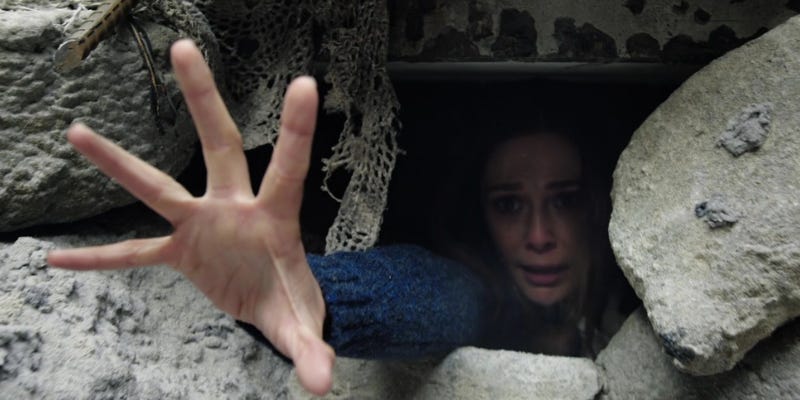Grief is difficult to define. It is an emotion. It is an experience. It is a motivation.
I know grief. I met her early on, as a child. One day, for no reason I understood, my mother was gone. The death of a loved one is a universally understood and profound experience of loss and grief. Other experiences that trigger grief include:
- the end of a relationship
- moving away from home or the loss of a support system
- the loss of a job, career goal, or financial stability, including due to retirement
- dealing with a medical diagnosis, disability, or change in status, including miscarriage
- the loss of a pet or treasured belonging
Grief is universal, but the experience and the process of it are highly personal and individualized. There are many models of grief, all based in observation and research, but there is no wrong or right way to grieve.

Introducing Wanda Maximoff, the Scarlet Witch
The Disney+ limited series WandaVision explores Wanda Maximoff’s grief in response to the death of her partner, Vision, and her many earlier losses that compound it. Wanda’s natural genetic affinity for ‘chaos magic’ was enhanced by experimental therapies with an infinity stone, and she gained the ability to manipulate energy, matter, and lived experiences. After losing Vision, her grief manifests as a powerful magic spell that traps the citizens of Westview, New Jersey, in a recreation of Wanda’s favorite sitcoms, where she and Vision live happily raising their twin sons. WandaVision is a supernatural dramedy about the kidnapping and forced servitude of a small town that ends in a battle between two sorcerers and the full erasure of Wanda’s false family. Wanda’s circumstances are not in any way relatable, but Wanda’s grief is.
Grief is a response.
Grief is an emotional response to loss. Common manifestations are sorrow, anger, or guilt, behavioral changes like social withdrawal, sleep disturbances, or difficulty concentrating, and physical symptoms such as headaches, nausea, and fatigue. These reactions are normal and generally healthy. Loss is traumatic; it should affect us.

The best-known model of the grieving process is the Kubler-Ross Five Stages of Grief. Initially introduced as the five stages of dying, the Kubler-Ross model was published in 1969 by Dr. Elizabeth Kubler-Ross in her book On Death and Dying, a psychosocial text based on interviews conducted with terminally ill patients. The Kubler-Ross model describes five phases of grief: Denial, Anger, Bargaining, Depression, and Acceptance. The sequence is understood as typical, but it is far from universal. Some people move through the stages in a different order, some cycle through them over and over, and others skip stages entirely. The model is meant as a guide for patients, providers, and loved ones to better understand the complex emotions created by grief.
The first four stages are trauma responses. Denial is a form of flight, anger and bargaining are varieties on fight, and depression is a version of freeze. These stages are a defense mechanism, allowing our brain to hit ‘pause’ and process the new normal on our own terms.

Grief is a process.
Wanda exhibits all five Kubler-Ross stages in WandaVision. Episode eight, “Previously On,” details how the events of the previous seven episodes came about. First, Wanda visits S.W.O.R.D. headquarters to confirm Vision was, in fact, dead and gone (denial). The confirmation causes her to run away and break down in tears (depression). She loses control of her powers and casts a spell over Westview, recreating Vision and the family she lost (bargaining). When her new reality is threatened, Wanda lashes out (anger). However, when confronted with the truth, she chooses to sacrifice Vision and her children to restore reality (acceptance).

The Kubler-Ross model is criticized for both its rigidity and its superficiality. Newer models take a more active stance, focusing on tasks to move through grief, tenets of connection, or embracing meaning-making through narrative constructivism. Wanda’s actions in response to her grief reflect these as well, though in her case, she takes narrative therapy to an unhealthy and (potentially) criminal extreme.
Wanda’s version of reality, the dramaturgical conceit of the television show, can also be read as a critique of the performativity of grief and trauma. Wanda is trying to learn how to grieve, drawing upon the models of grief we’ve made culturally available, while simultaneously showing us the emptiness, the insufficiencies of the models of trauma and repair we’re typically offered.
—Emma Louise Backe (source)
WandaVision is Wanda’s trauma response.
Grief is a presence.
In 1996, Dr. Lois Tonkin introduced the concept of “growing around grief.” In this model, grief does not abate, retract, or disappear. Instead, while grief remains constant, we gain experience and knowledge. We make space for our grief, and grow larger, wider, stronger.

It’s a simplistic but powerful model. Grief is universal, but some of us interact with it on an almost intrinsic level. When we experience loss as children, before we know who we are, separate from our parents or their expectations, it becomes a part of our identity. But regardless of when one first encounters grief, it is inevitably something we must learn to live with—and to grow around.
Grief is a disorder.
The DSM-5 introduced a new diagnosis of “Prolonged Grief Disorder.” In theory, PGD is to grief as PTSD is to post-traumatic stress. In other words, basically everyone experiences grief, and to a lesser extent, post-traumatic stress, but only a very small cohort experiences it pathologically as a disorder.
Below, I am sharing the diagnostic criteria for Prolonged Grief Disorder; however, I am skeptical that PGD is a separate disorder from PTSD or Depression.
Persons diagnosed with PGD are said to have “severe” symptoms of grief for a prolonged time, which is defined as more than a year for adults or more than six months for children. These severe symptoms include “intense yearning or a preoccupation with the deceased, with thoughts or memories of the deceased person occurring most days” AND three or more of the following:
- Identity disruption
- Disbelief about the death
- Avoidance of reminders of the fact that the person is deceased
- Intense emotional pain
- Difficulty reintegrating into relationships and activities
- Inability to experience a positive mood or emotional numbness
- Loneliness
- A sense that life is meaningless

I believe pretty strongly that pathologizing grief is bad. Do some people fall into a major depression brought on by grief? Yes. Should those people get healthcare in the form of therapy and medication as needed? Yes. Do we need to invent a whole new disorder to cover “people who are still sad about their husband dying thirteen months later”? No. No, we do not.

Do we need to invent a whole new disorder to cover “people who ruin the lives of somewhere between thousands and millions of people because they are grieving the loss of their imaginary children”? Still no, because such people do not exist outside of fiction. And even if they did, that is still PTSD, aka a disordered reaction to trauma.
I am not anti-psychiatry. I believe strongly in psychiatric intervention, psychiatric medication, talk therapy, cognitive behavioral therapy, dialectical behavioral therapy, group therapy, and intensive outpatient programs. I believe inpatient programs can be necessary and healthy. I’ve experienced eye movement desensitization and reprocessing therapy, and it was super weird and also worked.
I think regular, non-intensive, non-emergent therapy should be considered preventative care. I think children who lose a parent should go to therapy. I think adults who lose a parent would probably benefit from therapy. And I believe, strongly, that there is no wrong or right way to grieve, there is no appropriate timeline, and frankly, I shouldn’t ever get over losing my mother as a child. I should grow around it. I should learn to live with it. I should have a joyful and fulfilling life that I am proud of, that I imagine my mother would be proud of, but her loss happened to me and it mattered, and that’s okay. That’s real.
“But what is grief, if not love persevering?”
That grief is an expression of love is a beautiful sentiment. It may be a bit circular—you feel the loss because it mattered, you know it mattered because you feel the loss—but that’s beside the point. It provides permission to feel your feelings and the suggestion that all is not lost. Concepts of the afterlife and reincarnation, flowers blooming on a grave, or seeing a lost loved one in the features of their child are other examples of the latter. The many varied stages, phases, tenets, concepts, tasks, and other models of grief provide the first: permission to feel your feelings.

WandaVision is television about television. It’s fantasy about fantasy. It’s a story about a woman with phenomenal magical powers who feels powerless. Her emotions are so big that they consume her and everyone around her. Wanda’s loss is traumatic, her grief is disordered, and her depression causes harm to herself and others. But the story is about her journey. Wanda is the protagonist, and if Vision’s quote above is the thesis question of the series, Wanda’s quote below is the answer:

And I don’t need you to tell me what I need.
Loss is universal, which makes grief universal. The experience and expression of loss are specific to the individual; the experience and expression of grief must be, too. “The best way out is always through,” from Robert Frost, is another sentiment often shared around grief and suffering. It doesn’t really matter which method works to express and address our feelings of grief; the point is the doing. If it works for you, it works.
Explore More
- House of M: Revisiting The Alternate World That Inspired WandaVision
- An Ode to Wanda Maximoff: On Stigma, Self-Acceptance, and the Scarlet Witch (warning: discussion of self-harm)
- A Tasks of Mourning handout (therapy worksheet)
- Grief, Bereavement, and Loss (Physician Data Query), patient version
- Grief and Prolonged Grief Disorder
- What Not To Say To Someone Grieving
- Grief Never Ends, and That’s Okay.
- Grief is a Journey – Not 5 Stages
